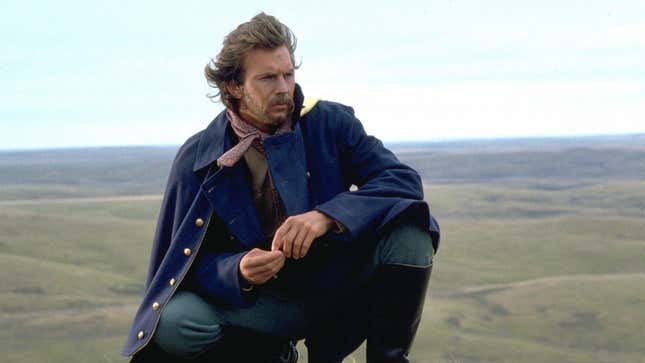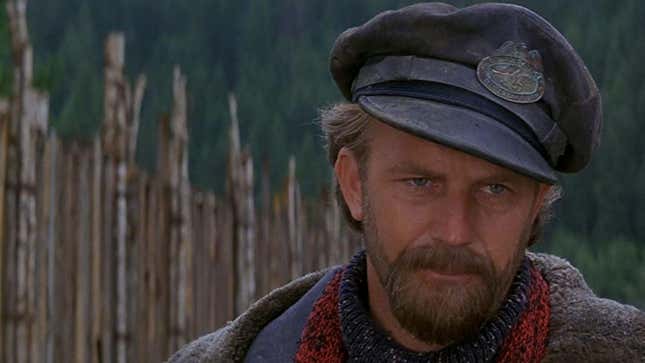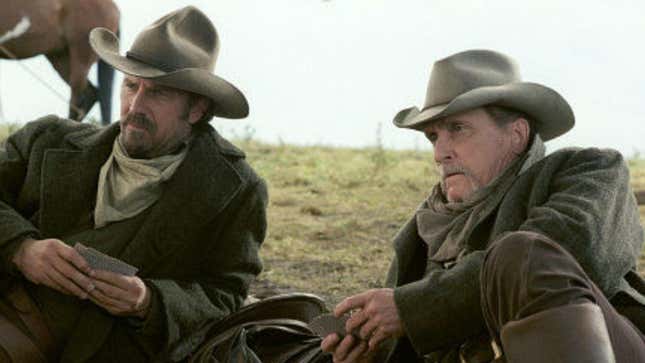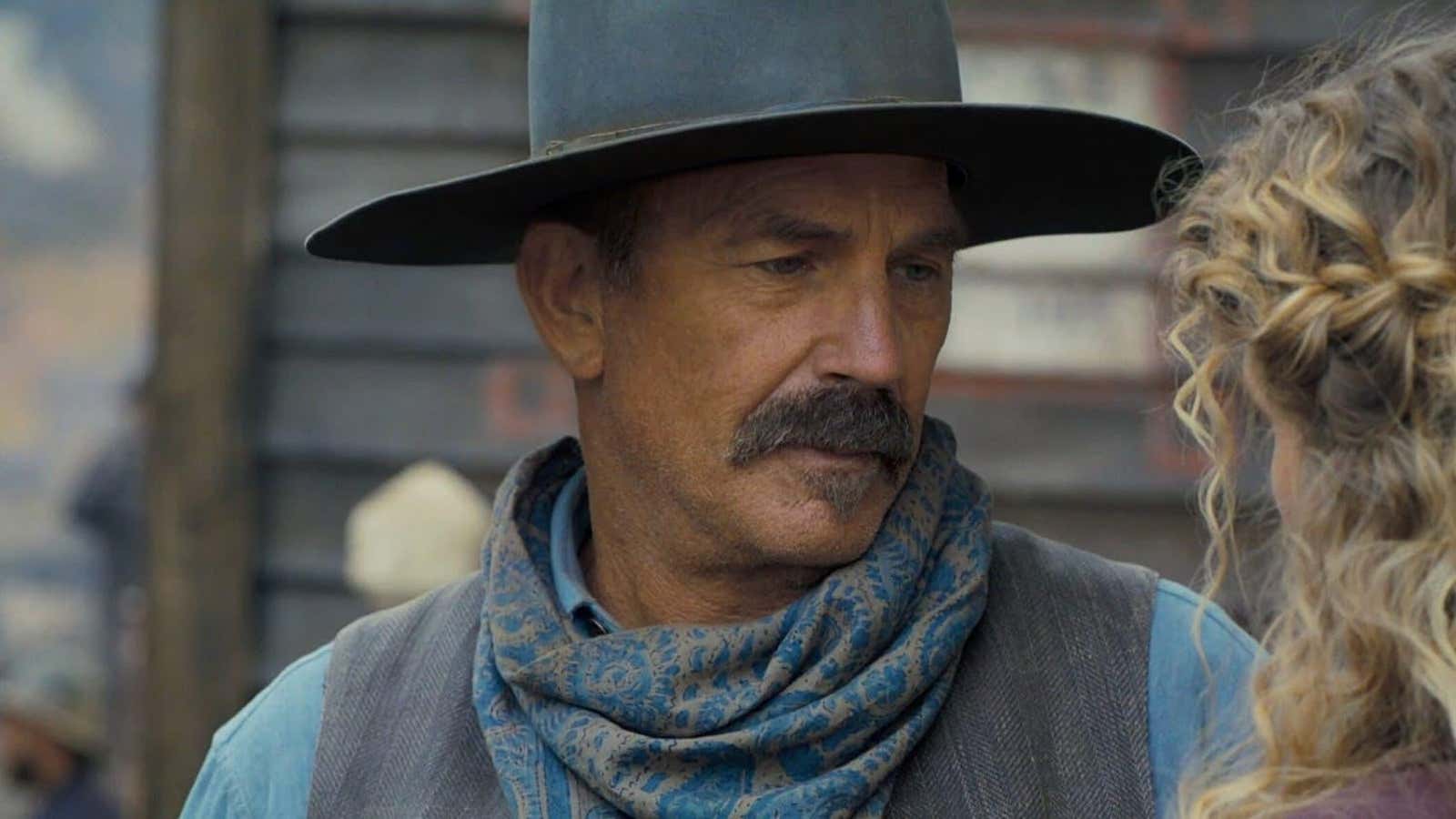In this column, I write about actors and directors who have worked together on at least three films, preferably without sequels in the mix. It’s a framework I chose in part because so many filmmakers on either side of the camera have these collaborators whose creative relationships are worth exploring. Yet sometimes, when looking through my master list of possibilities, it’s the near-miss stars who glare the brightest. Can you believe, for example, that for all the storied directors he’s worked with multiple times, the guy Al Pacino has returned to most often is Barry Levinson? Or that Tom Cruise has worked with seven different directors twice, but only Christopher McQuarrie more than that? (And almost all on sequels.)
Kevin Costner, however, may be the champion of this category. He’s worked with Roger Donaldson twice, but they have yet to reunite on a third D.C.-centric thriller following the pulpy No Way Out and the historical drama Thirteen Days. Similarly, it sure feels like there should be a third Ron Shelton/Costner sports movie after Bull Durham and Tin Cup, or a third Lawrence Kasdan/Costner western after Silverado and Wyatt Earp, but nothing yet. (His corpse work in The Big Chill doesn’t count.) He’s got two later-period movies under the haphazard direction of Mike Binder, but maybe it’s just as well not to get into the weird glorifications of The Upside Of Anger and Black Or White. And technically, Costner did make three movies with his frenemy Kevin Reynolds; before Robin Hood: Prince Of Thieves and Waterworld, there was a little-seen but well-regarded frat-boy comedy called Fandango that feels like an outlier next to a pair of big-budget adventures. That’s not a reason to disqualify Reynolds—but at the same time, none of these filmmakers seem like they can hold a candle to Costner’s most frequent collaborator, and possibly his favorite director: Kevin Costner.
That Kevin Costner would take direction from himself more often than anyone else is all the more notable because he isn’t a constant presence behind the camera like, say, fellow Western enthusiast Clint Eastwood (who, by the way, directed Costner’s most impressive performance in A Perfect World). Costner’s feature directorial debut Dances With Wolves was an Oscar-winning smash hit, but the filmmaking career it kicked off hasn’t been especially prolific. In the three decades following Wolves, Costner only directed two additional movies—and like his debut, they were both Westerns, starring himself. But now, the number of Costner-directed features is about to increase by as much as 100 percent. This summer, he kicks off another self-directed Western saga with Horizon: An American Saga—Chapter 1. The second chapter follows in August, and he’s apparently shot some footage for Chapter 3, though that one and Chapter 4 have yet to be greenlit. If James Cameron’s Avatar nicked some plot points from Dances With Wolves, maybe Costner has decided to return the favor and make his own Avatar: a single giant canvas for all of his pet ideas. Or perhaps he’s been inspired by his TV experience on Yellowstone to tell a long-form Western story away from the tyranny of the small screen and/or Taylor Sheridan.
Regardless, the release of the first Horizon finds Costner on the precipice of a directorial career that is about to be—at least if he has anything to say about it—dominated by a single undertaking. The release of a Part One might seem like an odd time to take stock of the Costner/Costner collaboration, but with only one three-hour Horizon in release, this may be the last moment before one long mega-movie takes up the majority of his filmography.

For a long time, that dominant mega-movie would have been Dances With Wolves. Even after Costner made The Postman and Open Range, Wolves remained his most famous and, in its way, infamous achievement. It’s a different sort of infamy than the boondoggle of The Postman; it’s the kind of grudge that can only be held against successful movies. Back in 1990, when it was building to a massive box office total on par with other 1990 smashes like Pretty Woman and Ghost, Costner’s directorial debut was a natural choice for the Best Picture and Best Director Oscars. (And compared to fellow nominee Ghost, it even looks like the arthouse choice.) But with the fullness of time, so many people came to resent its victory over Goodfellas and Martin Scorsese that it became almost a cliché to grumble about Costner getting his trophy a decade and a half before the Academy would deign to offer Marty a catch-up.
As a result, Dances With Wolves became almost, well, “underrated” would be stretching it, but perhaps underappreciated in certain corners. Of course, it’s nowhere near the movie that Goodfellas is—and anyone (Marvelite or otherwise) who snipes about later-period Scorsese’s supposedly self-indulgent runtimes should be sentenced to watch any given Costner-directed movie; his three hours never fly by the way so many of Scorsese’s longer movies do. But the slowness of Dances With Wolves is one of its virtues. Costner the director allows Costner the actor time to sink into the character of John Dunbar, a Union soldier assigned a solo gig at a remote military outpost, where he eventually befriends a tribe of Lakota. This is an unhurried, plot-light Western, and if it intentionally centers a white man’s point of view, it really does make an effort to do something nontraditional, even progressive, with its basic ingredients. In its way, the movie, however imperfect, is as bold an interrogation of Western tropes as its fellow Oscar-winner Unforgiven. As an actor, Costner did Dances With Wolves in the midst of an enviable hot streak—he had No Way Out, The Untouchables, Bull Durham, and Field of Dreams on one side of this movie, and Robin Hood: Prince of Thieves, JFK, The Bodyguard (terrible movie, but a huge hit), and A Perfect World (not a hit, but a great movie) on the other. Yet the lonely disillusionment and eventual enlightenment he gets to play as Dunbar is decidedly unlike his stable of charismatic straight arrows and more raffish but secretly sincere semi-scoundrels. Costner gave himself the part that others weren’t.
That pattern appears to continue with his post-Wolves directorial output. His actor-director career almost mimics the plot mechanics surrounding a gruff Western hero, in that it’s borne out of an occasional need for the actor to do it himself, because no one else will—or rather, because no one else was doing it quite right, adding a healthy dash of ego to his manful acceptance of the job.
Put more bluntly, it’s easy to read his post-Wolves projects as reactions to other then-recent turns in his career, with varying degrees of pissiness. The Postman, for example, feels like Costner’s answer to whatever dissatisfaction or conflict fomented on the sets of Robin Hood: Prince Of Thieves or Waterworld, and perhaps the inevitably negative comparisons—to past Robin Hoods, to the Mad Max series—that greeted their release. Maybe the problem with Prince Of Thieves wasn’t Costner’s insufficient Englishness, but the story’s insufficient American-ness, and maybe Waterworld (wherein Costner plays uncharacteristically gruff) was too Mad Max-style nasty, too devoid of hope. At least that’s one theory to explain the cornpone-apocalyptic Americana of The Postman, where a collapsed and technology-free United States of the future begins to hope again when Costner’s unnamed figure (who initially serves as a nomadic actor, no less!) restarts the U.S. Postal Service on the fly.

Open Range is a far more modest undertaking by comparison, with Costner and Robert Duvall as cattle-drivers pitted against a ruthless town boss who hates their free-range ways. It’s also easy to read it as the kind of old-fashioned Western he didn’t actually make the one time he worked for Clint Eastwood, who had mostly retired from the genre the year before A Perfect World, as well as a course-correction after some of Costner’s biggest flops as an actor, specifically the flip, quasi-hip crime-picture violence of 3000 Miles to Graceland. Finally, over the past decade-plus, Costner has played a lot of mentor figures and dad types; the first part of Horizon, then, feels like a revision insisting that these older characters could also be stronger men of action, if anyone let them.
Actually, Horizon feels like Costner taking a lot of different things into his own hands, albeit not always very well. Its gobsmacking (and often downright confusing!) ensemble of around 40 major speaking parts feels ready for the show bible of a streaming TV series, like he’s trying to one-up Yellowstone. Its borderline insane refusal to in any way stand alone as its own beginning-middle-end story, meanwhile, feels like Costner’s version of the film franchises that have dominated much of the past 20 years of American studio filmmaking. There’s even a potential bit of self-correction, in that there are far more characters and story threads here than in Costner’s other self-directed vehicles, which tend to zero in on his character.
In Horizon: An American Saga—Chapter One, Hayes Ellison (Costner) doesn’t even appear in the movie until a full hour into its 180-minute running time, and is just as subject as anyone else to getting lost in the movie’s epically baffling shuffle of characters. That generosity of spirit makes this quixotic vanity project also perhaps his most ego-free undertaking, at least as much as possible for a movie where Costner casts himself as a noble but ultimately irresistible cowboy of few words who a decades-younger woman insists on riding to sexual bliss—against his initial and noble resistance, of course. (Dutifully Transactional Costner Sex also figures into The Postman; it’s all a long way from the genuine carnality of No Way Out or Bull Durham.)
The first chapter of Horizon is also the movie where Costner seems least in control of the details of his production. His cross-cutting is rhythmless, contributing to subplot confusion rather than clarifying it; the dialogue from the screenplay he co-wrote slips in more than one obvious anachronism (unless settlers in the mid-19th century were the originators of TV-isms like “Really?” and “All good?”); and despite the extended runtime, plenty of its storylines manage to feel truncated. I’m still not completely sure how to summarize its plot even in the most basic terms. There’s a tiny town called Horizon, which has lured in settlers through an ominously ubiquitous flyer promising cheap land; it’s destroyed by an Indigenous faction, which sets in motion some subplots (the remainder of a broken family takes up residence at a Union military outpost; a group of settlers seek revenge) but not necessarily others (a wagon train heads west; Hayes Ellison protects a woman and her friend’s toddler). It’s as if rather than making several discrete movies indulging his interests in different types of Westerns, trends, and throughlines in his career, Costner decided to make them all at once.
Yet there’s still enjoyment to be located in Horizon, much more readily than an actual center or point. Like the first part of Zack Snyder’s Rebel Moon, of all the damn things, it has a seemingly inexhaustible supply of endearingly strange characters to introduce, and does so with a number of well-wrought, well-shot scenes. Individual conflicts simmer, while the movie as a whole flounders. It’s not a bad sit; it’s just a weird, unsatisfying one. Really, all of Costner’s directing projects are at least modestly entertaining—even The Postman, the most notorious of the bunch. No, it’s not as much fun as Prince Of Thieves, or even Waterworld, making their movie-star messianic tendencies more overt, but its all-American squareness has its charms. By the same token, Open Range, his simplest and most direct Western throwback entertainment, can’t avoid the Costner bloat, coming in at a lumbering 140 minutes. This has its advantages, like the movie’s extended shoot-out climax, one of the better such sequences in the checkered history of post-Unforgiven Westerns; it also dampens the throwback mood, because it’s hard to picture the 1952 version of this movie clocking in at such a length. But if Costner’s instincts as an old-fashioned showman are inextricable from his indulgent belaboring of the point, at least he’s never directed himself in a movie as tedious as, say, Lawrence Kasdan’s Wyatt Earp—a three-hour Western where you can see why Costner believed in it, and also why Open Range would seem fleet by comparison.

At the same time, it’s notable that Costner doesn’t really direct himself to his best performances. Dances With Wolves comes close, but his work as Dunbar, while sensitive and effective, pales slightly next to the likes of Bull Durham or JFK. Even setting aside that whole era, which includes most of the highest points in his filmography, Costner does rangier or more interesting stuff in plenty of movies made by other people, whether a neo-Western like Let Him Go or outright junk like Criminal, a bizarre and convoluted fantasy of even the worst boomer behavior managing to triumph over their generational successors. Is it the ultimate act of ego, directing himself to heroic cowboy feats without necessarily challenging himself to do more and better in those roles? Horizon suggests perhaps not; it certainly hasn’t been made under the assumption that audiences will riot without catching a glimpse of their man and his trademark cowboy-mode mustache.
No, what really seems to unify the Costner/Costner movies is their dedication to immersing their star (and whoever else) in a landscape whose vastness might otherwise seem unattainable. His movies aren’t exactly like watching rapt as an old-fashioned 105-minute Western unfolds; they’re more akin to an extended reverie where time expands in all directions, a MeTV marathon that never has to end. Dances With Wolves could pass off this bigness as a thoughtful meditation on a Native/settler dynamic that so many other movies had turned into cartoonish shorthand. But by the time we reach Horizon, Costner’s vision has turned unwieldy, if still oddly compelling. “He will restore their memories of the past,” promises the trailer for The Postman. It’s talking about how Costner’s character will restore social order by upholding the traditions of the U.S. Postal Service, but it also sounds like an actor/director mission statement. Costner isn’t restoring the actual past, or even necessarily romanticizing it (or at least not only romanticizing it), but restoring those feelings, come hell or high water (to namecheck just one neo-Western that feels more plugged into contemporary concerns). Costner’s star persona once depended on a particular, perhaps strategic dose of throwback Gary Cooper vibes; his self-directed movies increasingly suggest that vibes just weren’t getting the job done—that anything more current connecting him to the ’80s and early ’90s may have been getting in the way. Horizon suggests that Costner, as an actor and as a director, sees this job as a mission that keeps getting bigger, no matter how much he puts into it.
